|
|
|
Sort Order |
|
|
|
Items / Page
|
|
|
|
|
|
|
| Srl | Item |
| 1 |
ID:
138770
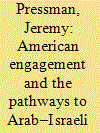

|
|
|
|
|
| Summary/Abstract |
This close empirical study of decades of US efforts to bring peace between Arab states and Israel helps reflect on Arild Underdal and Oran R. Young’s leadership typologies. Distinguishing between coercive leadership based on the incentives and sanctions that robust capabilities make possible and instrumental leadership focused more on talking, skilled mediation, and policy innovation is useful. However, this US mediation demonstrates that the two are not wholly distinct as previously suggested. The narrative of US efforts from Richard M Nixon to William J Clinton, including 22 cases of US involvement in Arab–Israeli mediation, suggests successful US mediation has been based on four factors. US involvement has led to breakthroughs when the US administration was highly engaged and kept at the problem after an initial diplomatic setback; benefitted from an exogenous event; managed that event to the US advantage; and dealt with strong Arab and Israeli partners.
|
|
|
|
|
|
|
|
|
|
|
|
|
|
|
|
| 2 |
ID:
138771


|
|
|
|
|
| Summary/Abstract |
Recent conflict research acknowledges the long-ignored intertwined nature of social conflict and environmental vulnerability; findings show that natural disasters affecting conflict regions can catalyse pre-disaster conflict developments. It is, however, unclear why disasters sometimes contribute to conflict escalation and sometimes to mitigating conflict. Drawing from the contrasting post-tsunami experiences of Sri Lanka and the Indonesian province of Aceh, this article investigates the tipping effects and asymmetrical impact of international relations, political participation and economic sustainability on post-disaster peacebuilding. Evidence shows that the domestic capacity for peacebuilding critically depends on the nature of international support. While Sri Lanka and Indonesia have many similarities, the latter’s major geopolitical relevance guaranteed sufficient, credible and targeted peacebuilding support, while the former received limited support and faced competing internal demands from Tamil and Sinhalese areas, thereby further restricting the potential for effective peacebuilding.
|
|
|
|
|
|
|
|
|
|
|
|
|
|
|
|
| 3 |
ID:
138767
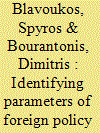

|
|
|
|
|
| Summary/Abstract |
This paper examines foreign policy change, identifying structural parameters of domestic and international origins that bring about major foreign policy shifts. Domestic structural parameters comprise the politico-institutional setting and advocacy groups in support of alternative foreign policy options. International structural parameters refer on the one hand to systemic changes that may bring about foreign policy realignment and, on the other hand, to the country’s role in the international system and its interactions with other countries that may activate foreign policy changes. We posit that this eclectic approach is necessary to account for major, multidimensional and complex, foreign policy decisions. We use this analytical framework to examine the Israeli re-orientation that enabled the signing of the Oslo Peace Agreement in the early 1990s.
|
|
|
|
|
|
|
|
|
|
|
|
|
|
|
|
| 4 |
ID:
138764


|
|
|
|
|
| Summary/Abstract |
This article attempts to demonstrate the importance of the discursive context for whether and, if so, how the European Union (EU) can exert normative power in different policy areas. Surprisingly, the concept of power has not been extensively discussed in the academic literature on Normative Power Europe, with the notable exceptions of Diez (2013); Keene (2012); Forsberg (2011) and Huelss (2011) (who also discuss the meaning of the ‘normative’). Focusing on power, the question asked in this article is how the discursive context of the politics of religion affects the EU’s ability to exert normative power in this area. The article examines the politics of religion by looking at the case of the debate about human rights versus religion in the United Nations Human Rights Council after the year 2000. The broader point addressed in the article is whether the EU can exert normative power regardless of the discursive context of the policy area concerned.
|
|
|
|
|
|
|
|
|
|
|
|
|
|
|
|
| 5 |
ID:
138765
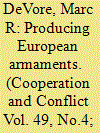

|
|
|
|
|
| Summary/Abstract |
Nothing is more important to Europe’s future as a security actor than supplying its armed forces with modern weaponry. Because individual states lack the research and development budgets and scale economies to remain autarkic, the survival of Europe’s defence-industrial base depends on international cooperation. As in other areas of international affairs, the ability of states to cooperate ‘under anarchy’ is inextricably tied to the existence of international institutions. However, the nature of arms production renders the design of institutions particularly challenging. Problems lie in both the multiplicity of potential cooperative outcomes and the variety of policy tools available. Ultimately, the choice of policies and policy tools can generate friction between the key groups of actors involved in defence-industrial policymaking. This study systematically explores how variations in the structure of international armaments institutions have shaped both the influence of different groups of actors and the nature of collaborative weapons projects. To preview my conclusions, three broad trends can be observed in the evolution of armaments institutions. These are as follows: (1) the gradual incorporation of a larger number of actors into the arms cooperation process; (2) the incremental exclusion of military professionals from armaments institutions; and (3) the growing influence of corporate actors.
|
|
|
|
|
|
|
|
|
|
|
|
|
|
|
|
| 6 |
ID:
138769
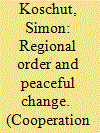

|
|
|
|
|
| Summary/Abstract |
The security community concept generally inhabits a rather small niche in the study of International Relations, as the logic of community fundamentally challenges the prevailing logic of anarchy. In this article, it is argued both on ontological and theoretical grounds that the concept’s intellectual heritage and depth transcends the boundaries of existing theories. In this sense, the concept of security community serves as a via media by linking different strands of International Relations theory together and by bridging various theoretical gaps. This argument will be developed in two steps. Firstly, it will be shown that the security community framework developed by Karl W Deutsch is deeply rooted in International Political Theory without belonging to one particular branch. By locating the concept in International Political Theory, an exercise that has been neglected by the security community literature; it will be secondly demonstrated that the concept of security community takes the middle ground between specific strands of International Relations theory, as these strands are ultimately based on concepts of moral philosophy.
|
|
|
|
|
|
|
|
|
|
|
|
|
|
|
|
| 7 |
ID:
138766
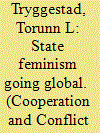

|
|
|
|
|
| Summary/Abstract |
This article examines the role played by small states in the promotion or reinforcement of new ideas and emerging norms within international society. More specifically, it examines the role played by Norway in reinforcing the normative framework of ‘women, peace and security’, with a particular view to Norway’s first period of membership in the United Nations Peacebuilding Commission. Norway is regarded internationally as one of the lead countries in terms of promoting women’s rights in relation to peace and security. The article discusses four possible reasons that may explain Norway’s apparent suitability and effectiveness as a norm entrepreneur in this particular issue-area.
|
|
|
|
|
|
|
|
|
|
|
|
|
|
|
|
| 8 |
ID:
138768


|
|
|
|
|
| Summary/Abstract |
This study reconstructs the concept of interstate rivalry in accordance with a min–max strategy in order to determine the necessary characteristics of rivalry, provide a template with which to assess existing conceptualizations, and provide a means by which conceptualizations of rivalry can be formulated and operationalized. I argue that there are two necessary characteristics of a minimal conceptualization of interstate rivalry — temporal dependence and issue competition. Contextual conceptualizations are then formulated by adding dimensions, such as militarization, identification, and psychological hostility, among others, to the minimal definition. By defining interstate rivalry in its most extreme form (when all of the potential dimensions of rivalry are present in the fullest), I also establish a maximal or ‘ideal-type’ conceptualization. In adopting a min–max approach, this project seeks to unify conceptualizations of interstate rivalry along a common continuum in which the empirical coverage of cases decreases as properties are added to the minimal definition.
|
|
|
|
|
|
|
|
|
|
|
|
|
|
|
|
|
|
|
|
|